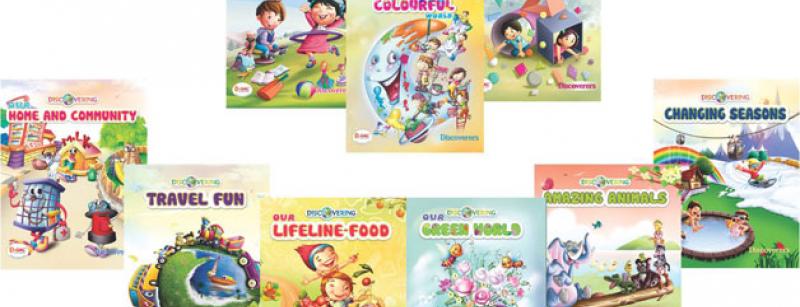
Scientific Learning System & Curriculum
Educomp's Research and Development team has, over the past few years, continuously strived towards bringing a change in the way education is perceived and imparted. In that spirit, each letter of E-DAC signifies the four-fold process of learning applied in the classroom to achieve positive learning outcomes. Each stage has been mapped to the developmental milestones of the learners and their unique learning styles. It has been designed in a well-structured manner containing relevant content and a diverse style of approach, with a flexible and focused methodology. The system is based on the belief that learning happens when attitude and perception towards learning are positive. By engaging and exciting the learner through concept- and skill-based games, the E-DAC approach provides an expository yet experiential opportunity that helps the learner discover and internalise concepts on her/his own. Learning here does not stop with mere acquisition of knowledge. Context-specific tasks allow each type of learner to assimilate and apply the newly acquired knowledge and skills in real-life situations, hence proving it useful and applicable. Learning and assimilating being contiguous, the learner completes the cycle of learning a concept only when she/he creates something on her/his own. E-DAC, thus, is a creative process that leaves the learner with an inherent sense of joy, confidence and achievement. At the same time it also ensures that the learner acquires values and skills that are lifelong.
Effective Pedagogical Strategies
At Takshila, we believe that if there is a gap in learning, it is not because there is a ‘problem’ in the child’s learning abilities; it is because the teaching has not been facilitated in the right spirit, using the right approach. Every learner has a unique learning style and learning pace. To ensure successful teaching-learning in the classroom, effective pedagogical strategies have been integrated into the books and lesson plans of the curriculum. These teaching-learning strategies ensure that learning has been imparted at all levels and a strong base has been established for all the learners to be able to build and create further. The teacher is hence able to move ahead with the lesson smoothly and a multilevel classroom system is thus established, wherein children at different stages of learning are constantly kept engaged and excited by the enriching educational experience.
SmartclassTM Technology
Every Takshila School is equipped with SmartclassTM technology. It is a digital initiative by Educomp to make available a vast resource of knowledge content to each class through an interactive multimedia white board, thereby fostering a better understanding and igniting a lifelong love for learning. The technology aims to:
• Brings abstract and difficult curriculum concepts to life.
• Improves the teacher's effectiveness and productivity.
• Makes learning an enjoyable experience for students.
• Maximizes the academic performance of students.
• Enables a constant monitoring of your child's progress in class.
Contemporary textbooks
Extensive research has gone into creating the textbooks for Takshila schools. These books link the learning process to the development of life skills. We believe that learning happens only when a learner is joyously engaged. It becomes beneficial if the emotional quotient, i.e., EQ precedes the intelligence quotient, i.e., IQ. Therefore, the textbooks have been designed keeping in mind that they facilitate learning through fun and interactive activities, and games. The approach of these books is application-based thus enabling children to understand the significance of learning and link it to the world around them. The learners are also introduced to a number of vocations that are directly linked to the concepts learnt, thus making them relevant. The children study as apprentices and work on projects using the concepts learnt, forging a connection between what the children have learnt in class and being able to apply it in their real lives. This also ensures that the value and dignity of labour is imbibed in them. The books, thus, bring innovation into the teaching-learning process in the classroom by engaging and involving the learner at every step. Our effort is to reach out to learners in a manner that not only appeals to them but also develops in them the thirst and ability to learn more and ultimately arm themselves with lifelong skills and values that will equip them for the challenges of the next century.
Continuous assessments
Takshila schools use assessments as an effective learning tool. These assessments have been carefully integrated in the curriculum so that they are non-threatening and give both the teacher and the learner a diagnostic opportunity to assess learning and take remedial measures appropriately. The teacher is able to reinforce the concepts using the right pedagogical strategy to ensure effective and complete learning for each learner based on the outcome of the assessment. An analysis of this outcome is also used to guide the learner in making future vocational choices. Skilled Teachers. At Takshila, our teachers are facilitators who 'facilitate’ learning. Our ‘facilitators’ attend scientifically-planned workshops at regular intervals to ensure continuous professional development. They are equipped with a vast repertoire of the latest tools and techniques of the teaching-learning process, as well as possess an updated knowledge of the best pedagogical practices from around the globe.
Skilled Teachers
At Takshila, our teachers are facilitators who 'facilitate’ learning. Our ‘facilitators’ attend scientifically-planned workshops at regular intervals to ensure continuous professional development. They are equipped with a vast repertoire of the latest tools and techniques of the teaching-learning process, as well as possess an updated knowledge of the best pedagogical practices from around the globe.
Campus as a Teaching-Learning Tool
Interestingly, the total physical environment of the Takshila schools is designed as a learning tool. Takshila believes in the infinite capacity of the young minds to absorb knowledge from the surroundings they live in. With this in mind, all Takshila schools are designed around the concept of ‘Walls Speak’--a concept developed by leading school architects, designers, educationists and psychologists.



